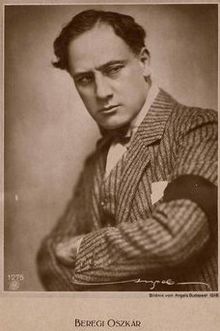Oscar Beregi (actor, born 1876)
Oscar Beregi | |
|---|---|
 | |
| Born | Oszkár Bergeri 24 January 1876 Budapest, Hungary |
| Died | 18 October 1965 (aged 89) Hollywood, California, U.S. |
| Resting place | Woodlawn Memorial Cemetery, Santa Monica |
| Occupation | Actor |
| Years active | 1916-1953 |
| Children | Oscar Beregi Jr. Lea Beregi[1] |
Oscar Beregi (born Oszkár Beregi, 24 January 1876 – 18 October 1965) was a Hungarian-Jewish[2] actor who appeared primarily in German films.[3]
Biography[]
Beregi was born in Budapest, Hungary, and was the father of actor Oscar Beregi Jr. He acted on stage in Hungary for 21 years.[4] In April 1920, as "the only Jewish actor of prominence" acting with the Budapest National Theatre, he was the subject of a demonstration that led to the group's changing its program and presenting a play in which Beregi did not participate.[5]
In the early 1920s, Beregi was exiled from Hungary because of his "alleged political activities".[6] During the exile he acted in Vienna for four years.[6] He served as president of the Film Actors' Association of Vienna.[7] Beregi appeared in 27 films between 1916 and 1953. He is remembered for his performance as Professor Baum in Fritz Lang's film Das Testament des Dr. Mabuse.[citation needed] In 1926, Beregi signed a five-year contract with Universal Pictures.[8]
Beregi died in Hollywood, California, and was buried in Budapest, Hungary.[3]
Partial filmography[]
- Ártatlan vagyok! (1916) - Pierre, katonaorvos
- Mire megvénülünk (1917) - Áronffy Lóránd
- Hófehérke (1917) - Balassa Imre mérnök
- The Stork Caliph (1917) - Tábori báró / kikötõmunkás
- A föld embere (1917) - Bán Ferenc, bányamérnök
- Károly bakák (1918) - Epres János
- Az aranyember (Man of Gold) (1919) - Tímár Mihály
- Jön az öcsém ("My Brother is Coming") (1919, Short) - As öcs
- Ave Caesar! (1919) - Alexis gróf, testõrkapitány
- A tékozló fiú (1919) - Wagner Oszkár, a fia
- Meriota the Dancer (1922) - Cesare Borgia
- William Ratcliff (1922)
- Children of the Revolution (1923)
- Das verbotene Land (1924)
- Vier Nächte einer schönen Frau (1924)
- Die Tragödie einer Frau (1924)
- Die Sklavenkönigin ("The Moon of Israel", lit. "The Queen of the Slaves") (1924) - Amenmeses
- Jiskor (1924) - The Count
- Ssanin (1924) - Wladimir Petrowitsch Ssanin
- Das Gift der Borgia (1924)
- The Curse (1925) - Jehuda Nachmann
- The Love Thief (1926) - Prime Minister
- The Flaming Forest (1926) - Jules Lagarre
- Camille (1926) - Count de Varville
- Butterflies in the Rain (1926) - Lord Purdon
- The Woman on Trial (1927)
- Der Geliebte seiner Frau (1928) - Polizeikommissär Ralph Förster
- Andere Frauen (1928)
- Povara (1928) - George Stralila
- Love in May (1928)
- Der Dieb im Schlafcoupée (1929)
- Die Jugend am Scheideweg (1929)
- Juwelen (1930)
- A kék bálvány (1931) - Turner, milliomos
- Ein Auto und kein Geld (1932)
- Kísértetek Vonata (1933) - Dr. Stirling
- Das Testament des Dr. Mabuse ("The Testament of Dr. Mabuse") (1933) - Prof. Dr. Baum
- Iza néni (1933)
- Rákóczi induló (1933) - Báró Merlin Ádám, földbirtokos
- Anything Can Happen (1952) - Uncle John
- Tonight We Sing (1953) - Dr. Markoff (uncredited)
- Call Me Madam (1953) - Chamberlain (uncredited)
- Desert Legion (1953) - Si Khalil
References[]
- ^ Liloo (18 October 2014). "The legend of Isadora Duncan: Oscar Beregi (24 January 1876 – 18 October 1965)". Retrieved 7 January 2017.
- ^ Siegbert Salomon Prawer, Between Two Worlds: The Jewish Presence in German and Austrian Film, 1910-1933, Berghahn Books (2007), p. 213
- ^ Jump up to: a b Wilson, Scott (2016). Resting Places: The Burial Sites of More Than 14,000 Famous Persons, 3d ed. McFarland. p. 58. ISBN 9781476625997. Retrieved 16 July 2017.
- ^ Magyar, Stephen (22 May 1925). "How Hungary Treats Her Greatest Actor". Wisconsin Jewish Chronicle. Wisconsin, Milwaukee. p. 4. Retrieved 26 May 2018 – via Newspapers.com.

- ^ "Anti-Semitic Demonstration Against Jewish Actor". The Jewish Monitor. Texas, Dallas. IJPB. 23 April 1920. p. 1. Retrieved 26 May 2018 – via Newspapers.com.

- ^ Jump up to: a b "In the Theaters of Europe". The Brooklyn Daily Eagle. New York, Brooklyn. CTIS. 15 March 1925. p. 68. Retrieved 26 May 2018 – via Newspapers.com.

- ^ "Won Fame in Europe". The Gazette. Canada, Montreal. 22 January 1927. p. 15. Retrieved 26 May 2018 – via Newspapers.com.

- ^ "(untitled brief)". The Atlanta Constitution. Georgia, Atlanta. 9 May 1926. p. 43. Retrieved 26 May 2018 – via Newspapers.com.

External links[]
- 1876 births
- 1965 deaths
- Hungarian Jews
- 20th-century Hungarian male actors
- Hungarian male silent film actors
- Hungarian emigrants to the United States
- Male actors from Budapest
- Hungarian expatriates in Austria
